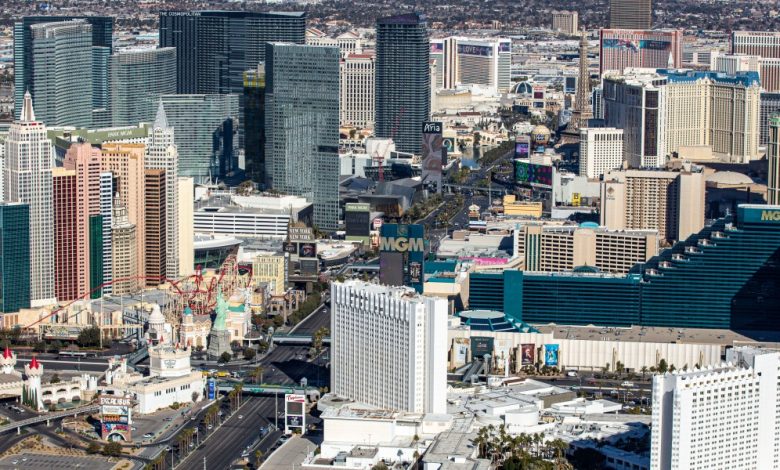Las Vegas visitors overpay for hotel rooms because major resorts use “under the table deals” to boost rates, the lawsuit says

A federal lawsuit in Nevada is seeking class-action damages for scores of hotel guests who have booked rooms in Las Vegas since 2019, alleging that most hotel-casinos on the Las Vegas Strip have used a third party to illegally set prices.
The complaint, filed in US District Court in Las Vegas on Wednesday, alleges that casino giants MGM Resorts International and Caesars Entertainment, along with Treasure Island and Wynn Resorts, share information with a company that uses pricing algorithms to “maximize market-wide prices.”
She accuses the resorts and Rainmaker Group Unlimited, a Cendyn Group revenue management company, of “algorithmically driven price fixing … at the expense of consumers and in violation of antitrust laws.”
The Associated Press emailed Rainmaker for comment. Michael Bennett, a representative for Cendyn of Boca Raton, Fla., declined to comment.
The lawsuit was filed on behalf of plaintiffs Richard Gibson and Heriberto Valiente by attorneys at the law firm of Hagens Berman Sobol Shapiro in Seattle and Berkeley, California.
It is seeking group status and unspecified monetary damages for “tens, if not hundreds, of thousands” of people based on alleged antitrust violations of the federal Sherman Act.
MGM Resorts, which operates properties including Bellagio, New York-New York, MGM Grand and Mandalay Bay, responded Thursday with a statement calling the lawsuit “baseless.”
“The allegations against MGM Resorts are factually inaccurate and we intend to vigorously defend ourselves,” it said.
Wynn Resorts declined to comment. The Associated Press left messages seeking comment from representatives from Treasure Island and Caesars Entertainment.
Caesars Entertainment operates properties on the Las Vegas Strip including Caesars Palace, Harrah’s, the Horseshoe, Paris Las Vegas and the Flamingo.
In a statement, plaintiffs’ attorney Steve Berman invoked and reshaped a ubiquitous advertising campaign slogan introduced in early 2003.
“What happens in Vegas will no longer stay in Vegas,” Berman said. “We intend to expose the undercover dealings being perpetrated by these Vegas hotels.”
Alan Feldman, a longtime executive at MGM Resorts who is now a fellow at the International Gaming Institute at the University of Nevada, Las Vegas, said hotels, airlines and car rental companies monitor costs and prices in what he calls the “travel ecosystem.”
“Rest assured, they’re watching each other,” Feldman said. “Then they can decide whether to go above it, below it, or just ignore it.”
“But I can’t imagine these companies talking to each other,” he said, “let alone on price.”
The lawsuit highlights concerns about algorithmic pricing identified in a 2017 speech by Maureen Ohlhausen, a former acting chair of the Federal Trade Commission.
Ohlhausen defined a computer algorithm as a set of rules or instructions that can model thousands of “extremely complex and nuanced behaviors” in a fraction of a second, “and respond to changes almost instantaneously.”
She said companies share their pricing data with “a shared, outside agent” who uses the information to program its algorithm “to maximize industry-wide pricing.”
“We even have an old-fashioned term for it,” Ohlhausen said, “the hub-and-spoke conspiracy.”
“In fact, the firms themselves don’t directly share their pricing strategies,” she said, “but that information still ends up in common hands, and that shared information is then used to maximize market-wide prices.”
The court filing said two former Rainmaker employees told attorneys the company’s products are used by 90%, or “almost every” property on the resort-lined Las Vegas Strip. The lawsuit did not identify the former employees.
The Las Vegas Review-Journal reported that average daily room rates for Strip resorts hit record highs in 2022, topping $200 per night in October during a busy convention month.
For the year ended November, the average price was $170.45, the highest in history, and didn’t include additional resort fees or free room accounts made available to high rollers, the newspaper said.
Learn how to navigate and build trust in your organization with The Trust Factor, a weekly newsletter exploring what leaders need to succeed. Sign up here.



